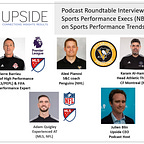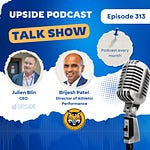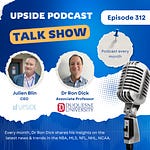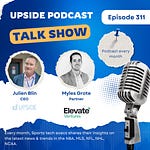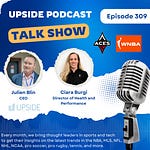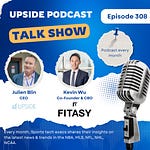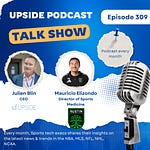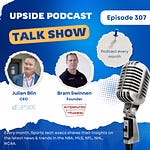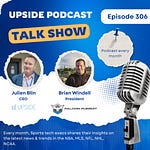This week we had the honor to interview again a group of sports performance experts.
Alexi Pianosi, S&C coach for the Pittsburgh Penguins (NHL).
Pierre Barrieu, an experienced high performance director in the MLS (LA Galaxy, LAFC, Toronto FC, NY Red Bulls, etc.), Premier League (Leeds United FC) and FIFA expert.
Karam Al-Hamdani, the Head Athletic Therapist at CF Montreal (MLS team).
Adam Quigley, an experienced athletic trainer in the MLS (LA Galaxy), NFL (Saints) & US Soccer national teams.
📝Show Notes: Through this interview, we touched on muscle injuries and nutritional strategies, and the correlation between athletes' dehydration and soft tissue injuries. Then we discussed the best strategies for sleep management. We also touched on the best strategies for athletes' recovery and associated treatments. Lastly, we discussed Saudi Arabia's big push into sports as well as Leo Messi’s move to the MLS at Inter Miami FC.
🚀Best Quotes: Here are some of the key discussion points and best quotes from our conversation with Adam, Pierre, Alexi, and Derek:
On muscle injuries and nutritional strategies:
Pierre Barrieu:
“If your blood gets thicker, you need more water to make it thin to better deliver nutrients, to the muscle and energy. So that's very basic, but that's common sense”.
“ I've been through so many nutritional strategies that I've delegated to experts, but again, I'm sure that we're going to have three or four different opinions. It used to be the Acai Berry, the Muscle Milk to recover and then the Body armor and Then now it's the collagen, and there will be more and newer products”.
“If you dehydrated, there's less blood flow so you get less oxygen delivered, Therefore less muscle tone and more exposed to injury. So it's pretty simple. The bottom line is drink before you gets thirsty. Drink plenty of fluid and then the right type of fluid and eat a well-balanced meal and you'll be fine”.
Alexi Pianosi:
“So nutrition is one piece in a larger puzzle, I think, and I always consider nutrition contributing to the underlying physiological system that's going to help prepare the athletes. So you're not going to prevent an injury or fix an injury with a nutritional strategy, but you can help make the foundation a little bit stronger by appropriate and adequate nutritional practices on a regular basis”.
“Then I think when some of those other factors come in such as time zone changes, back-to-back games, changes in acute chronic workload ratios, things like that, hopefully you're in a better position to handle that”.
Adam Quigley:
“So I think it's education from both the athlete, educating the staff of what's normal for them and having a baseline of maybe their nutritional intake daily. And then from the staff educating why it's important, why now, and then how to actually implement things and, and keeping up with the accountability”.
On the best strategies for sleep management:
Karam Al-Hamdani:
“The main things that I have used to help manage athletes’ sleep are playing with the ambient temperature. I also try to use cold tubs immediately after the game to really drop the athletes’ nervous system. And then I use tart cherry and melatonin. I also used Helight’s light therapy”.
Pierre Barrieu:
“The basic one that Karam mentioned are the temperature, exposure to light, exposure to noise. Now regarding both the headphones, especially noise canceling headphones in the plane, there's a lot of studies that have shown that the constant buzzing in the brain of the engine is disrupting your beta rhythms in the brain, which is a big factor of fatigue after that. Wearing noise cancelling headphones will mitigate the risk".
So yeah, if you can control these three and your timing of exposure to light and and sleeping hours. You will have controlled most of what’s controllable. Also (reducing) exposure to the blue light and the white light while controlling volume is important”.
“Routine is key. So make sure that athletes have the same routine, same timing of meals, bedtime, and that they use lukewarm baths. Also make sure to avoid caffeine, but at one point, you run into a problem because you will have exhausted all the strategies and there's not much else you can do”.
On the best strategies for athletes' recovery and associated treatments:
Alexi Pianosi:
“I think it's also dependent on the person as well for what they respond to because I think there's an underlying physiological principle to most things. Hydrotherapy, a little bit of hydrostatic pressure, contrast, a little bit of change in fluid dynamics, things like that. So the underlying science is usually pretty good in most of them”.
“But if a person I think believes that “this is really going to help me, I'm going to feel so much better”, then they start to feel better, call whatever percentage placebo effect”.
“Cold tubs after games, things like that, is a pretty common one. And I think if you're looking at, Hey, we have to play a back to back game, we probably have a lot of localized inflammation in the lower body after a game we have to play in 18 hours or something like that”.
“Maybe a cold tub fits really good. If we're in training camp and we just did a a strength session and your legs are a little sore from that or from the strength session yesterday, we want that adaptive response. Maybe the cold tub's not the good thing. So educating them on that front is key”.
“So whether it's biofeedback, breathing techniques, hot cold, cryotherapy, I think there's a lot of different ways you can affect that, but it's what's the best way to create the modulation that you want within that person to help get them back to where they feel their best and where they perform their best following a game or following an intense activity”.
Adam Quigley:
“I've also found that what’s also really works well is breath work. You can utilize it to stimulate the parasympathetic nervous system. You can use it to activate the sympathetic and get things going. And I think I've seen great results on recovery days”.
“Regarding the breath work component, I've seen to be very, very interesting and oftentimes not practiced. And one, obviously there's an educational side to it that, I didn't learn that in athletic training school or in sports medicine and in the master's degree, but when I've created that type of environment or that container for the athletes, some of them will breathe for five rounds and fall asleep and be out cold for 20, 30 minutes and they'll wake up after and say, oh my, it looks like they're reborn out of a cocoon. They've never rested that heavily ”.
Pierre Barrieu:
“I don't know if you guys have used thermography. I've looked into it deeply and I finally had a chance to experience it. I used ThermoHuman, and the reason why I mentioned it is because the way we've been using it is to actually give us a profile of what type of fatigue these guys are suffering from, subsequently knowing what type of recovery strategies they should use”.
“And from my recent experience as well as recent studies, depending on origins of fatigue (structural or metabolic), different recovery strategies should be prioritized (Cryo or Heat therapies), as well as if the camera shows some hyper or hypothermy."
Karam Al-Hamdani:
“Having a conversation, figuring out how they feel if they are feeling anything that's out of the ordinary where, et cetera, that's one. Two. you have to be hands-on. So actually using our hands as tools to see if there's anything that's off. If there's a muscle that's a little bit hypertonic as opposed to the other one”.
“Do we see any balance, imbalances in standing forward for the flexion or rotation to one side versus the other after the, after the game, which, you know, can correlate with some muscle tightness on one side versus the other, et cetera”.
“Just these simple tools that we have in our arsenals as athletic therapists, athletic trainers, or even physical therapists that could serve us or could take us a long way, and compliment that stuff with the cryotherapy, with the Theraguns, with the recovery boots, et cetera. So that's really my take on recovery”.
On Saudi Arabia's big push into elite sports:
Karam Al-Hamdani:
“I think, for me, it's a way for them to market themselves. Once upon a time it was Dubai, then it became Qatar and now Saudi Arabia has proclaimed themselves as that power in the Middle East that's going to attract all of the world and for them to become the new hub, superseding Dubai and Qatar”.
“And one of the ways to do that is to attract top talent. In this case, like you said, golf and football. And like you said, Formula one is as another piece for them to showcase their buying power, so to speak”.
Pierre Barrieu:
“This is soft power through sport. This is about image and then unlimited money. It's not being politically correct, it's just exactly what is, whether you agree with it or not, that's a different story, but that's what they do”.
“How efficient is it gonna be in the long term? I'm not so sure, but if you start something like this, you have to make sure it lasts somehow in time”.
On Leo Messi’s move to the MLS at Inter Miami FC:
Adam Quigley:
“I don't know if generational is the correct term, but Michael Jordan signing to Nike and what Jordan was for basketball. I think this is something that could be very similar to a generational shift in the world of football in the United States and also in the world”.
“Obviously there's a dollar sign of it where you have a player like Ronaldo that goes to Saudi for the money. Then you have things like this where, if Leo's coming to the states simply for the dollar sign, I think this is more about putting yourself in the names of the greats to really change the world of the game, but also the world of the literal world of the impact in football, the impact on culture, on people, and experiencing the game and experiencing the ways of their life”.
Pierre Barrieu:
“Beckham was for me, the pivotal moment in the MLS, and we're talking about the same amount of money back then, with the endorsement and so forth. But then he brought the exposure, he brought everything else”.
“The league, the MLS would've been doing well without Messi. They will be doing better with him. He brings some exposure (…) I compare it to the Beckham moment, and I think Beckham was way more crucial at the time than Messi now”.
Karam Al-Hamdani:
“But like you said, Julien, the average price of a ticket went up from $38 a ticket for an inter Miami game up to $460 a ticket. Ever since he's signed, I've had countless people that I know that happened to have my phone number, that texted me, and that I haven't spoken to in ages and go, Hey, we know Miami are going to play you guys twice next year. They're already trying to talk to me about me giving them my tickets for the Inter Miami game next year”.
“So that just goes to say, or to show how much of an impact this person has and to Adam and, and to Pierre's point, this is a generational thing. And just like you said, when Beckham came into the league, there was this paradigm shift. and I feel like we're down the road now where this is another shift that's happening ”.
You may also like:
🔥Upside Chat: Alexi Pianosi, Strengths and Conditioning Coach, Pittsburgh Penguins (NHL)
🔥Upside Chat: Pierre Barrieu, High Performance Director, Toronto FC (MLS)
🔮 2022 Upside Top Sports Tech Predictions (NFT/Metaverse, Sports Performance, IPOs/M&As..)

